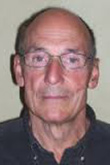News From Mark Shanda, USITT President
The Impact of a Teacher’s Question

Dennis Dorn
Around 1984, when I was a graduate student in the University of Wisconsin-Madison’s master of fine arts in theatre technology program, my mentor and teacher, Dennis Dorn, profoundly affected my life by asking a single and most timely question.
The first technical rehearsal for a faculty directed project had occurred the night before, and I dreaded my morning trip to Dorn’s office to report in. The stage director of the project had held the rehearsal until well after the 10:30 p.m. department schedule guidelines, aggravating many, and then concluded his “notes” session focusing his attention on me in my role as the assigned technical director, shouting a long list of what I “had to have done before the 7 p.m. start of the second tech or else.” His demands were far more than I could accomplish in less than eighteen hours, and it was now Thursday. In addition to these production demands, I had class, work hours, and whatever small outside life one has in graduate school.
Dorn was working at his drafting table drawing elegant plates of scenery that soon would be constructed in the scenic studio for an upcoming production. Screwing up my courage, I haltingly shared the list of the previous evening’s difficulties, talked about the priorities that I felt needed to be addressed, and expressed my frustration at the “or else” demands of the director.
Without looking up from his work, Dorn uttered a question that had never been asked of me, but one that to this day has guided me. “Mark, how well do you handle failure?”
Taken aback, I couldn’t process the question. He put his pencil down, looked straight at me and said, “Through his demands, the director has tried to take your power as a collaborator away. If you let his attitude control you, then you cannot be effective. Do what you think best for the production in the time that is available, tell the director at the start of rehearsal what you have accomplished, affirm your commitment to the project, and declare what you have ‘failed’ to achieve. Nothing more can be expected.”
Dorn was not asking me to shirk my duties or walk away from my assignment. Rather he was teaching me to give my all, be direct in my communication, and accept the consequences for my own behavior. He taught me what it meant to be personably responsible and not be defined by others. This insight has served me well ever since.
I don’t ever like to “fail,” but knowing my personal limits and not allowing others to define my success guides my work life still. No one is immune from limitations. Knowing how well one can handle failure lifts a burden of inappropriately placed responsibility eliminating wasted energy and providing focus for success.
I will always remember his question, “How well do you handle failure?” and its impact on me. For Dorn’s insight, I am eternally grateful.


We'd like to hear your comments on this story.
Please e-mail Mark at Shanda.1@osu.edu.